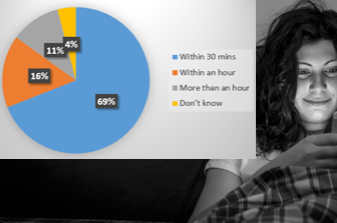Your smartphone is changing you
Technology gives – and takes away. Chris Goswami assesses the impact it's having, and gives suggestions for recalibrating our lives in this new and complex culture

This morning you got out of bed and checked your smartphone – you looked at it within 30 minutes of waking up. Then during the day you checked your phone every hour – but likely much more often.
Don’t believe me? Well you might be the exception but those are typical figures across surveys, including the one below from telecoms regulator Ofcom. Whether we’re out with friends, sitting on a train, waiting for the dentist, or (dare I say it) sitting on the toilet, it seems the old pursuit of spending time doing nothing has all but gone.

69 per cent of us check our phones within 30 minutes of waking up - Source Ofcom 2015
Technology gives and takes away
The advantages of mobile technology are huge and increasing, but internet phones create side-effects.
First, we are losing the ability to “know stuff”. We don’t necessarily KNOW anything, we just know where to look. In his book Flickering Pixels, Shane Hipps states how we have become skimmers: “our intellects are spread a mile wide and an inch deep”. Peter Philips, working in Digital Theology at Durham University recently told me “we are becoming reliant on the internet for outsourcing our memory. We no longer remember things, we just know where to look”.
Secondly, we become conditioned to expect things immediately. When we click we are no longer prepared to wait. People will now abandon a web page or a video on their phone if it doesn’t load within six seconds. Who decided that six seconds was too long to wait for a page of news, or a trailer? Well we all did, but a little at a time, so we didn’t really notice.
A number of authors conclude that we are losing the ability to think deeply and rest properly.

Technology is becoming invisible
People suggest that our online behaviour changes the way we behave offline. In other words technology conditions us to always expect stimulation, to always be intolerant of delays etc. This is probably true but it goes deeper than that. There is no longer a separation between online and offline. Mobile technology has become so seamless and ever-present, we use it without thinking, sometimes without knowing. Taking photographs, finding directions, listening to music and reading our Bibles– these are all worthwhile activities where the technology (the device) has become so good that we are oblivious to it. And when technology becomes that seamless, that familiar, it becomes part of us.
So with our phones glued on, we are interrupted throughout the day but we don’t view this with any concern. These interruptions just happen, and it’s common to see people using phones say at a restaurant rather than connecting with people they are actually with.
The mobile-phone designed to help us talk is the reason we talk less.

Technology is resulting in information overload
In their book The Hyperlinked Life the authors report that three quarters of church-going adults feel overwhelmed by the information they need to stay up to date. I am no shining example but I did recently refrain from buying an Apple Watch. I am a gadget-geek so it was tough to go for a dumb fitness-tracker instead. My reason for avoiding the watch is that I’m not yet ready for my wrist to go into a spasm every time someone sends me a text or email. Information overload is a challenge.
As Christians we should not be mastered by anything of this world. Technology has many positives, it’s fun to find out things and stay in touch, but those things that master us tend to sneak up on us! The authors suggest we need to “hit the reset button and recalibrate” how to live in a new and complex culture:
-
At mealtimes keep phones away, or try making a “phone stack” – switch to silent and pile your phones at one end of the table. Just leave them there, even if those pings, rings and vibrates still find a way out.
-
Occasionally live life in airplane mode - create moments and places during the week where there is stillness and nourishing rest. Hey you can still find places in the country where there is simply no signal.
-
Rethink your motives – are we simply pinging replies, counting likes, and viewing retweets for the buzz of seeing how “popular” we are?
This is difficult. Probably more difficult than say cutting down on sugar or alcohol. The internet has entered every aspect of our lives and frankly we need it.
But ultimately God whispers to us to find him in the stillness. … Alternatively, if you find this all too difficult, you can always book into this luxury hotel. Each room has a signal-blocking grid and a magic button by the bed. Push to kill the internet.

All pictures: Shutterstock, except top image (Woman with smartphone at sunset - FreeDigitalPhotos.net)
Chris Goswami is Director of Marketing & Communications at Openwave Mobility and is studying and training for ordained ministry in the Baptist Church. He was recently named Christian blogger of the year for www.7minutes.net, where this article first appeared. It is republished with permission.
Baptist Times, 25/04/2016